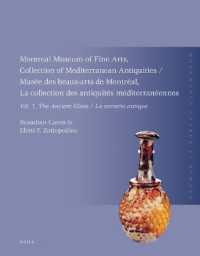- ホーム
- > 洋書
- > 英文書
- > Psychology
Full Description
Within developmental psychology, it has been proven that families are a significant context for development. It is also well known that in Latin America, families represent a deeply rooted societal value, yet the continent has often been overlooked within the research base.
Family and Contexts of Development offers an eco-cultural and contextualized contribution focusing on how the family functions as a context for development in Latin American throughout the life span. Editors Mariano Rosabal-Coto and Javier Tapia-Balladares bring together leading researchers in the field to present evidence of how both family and culture are prominent dimensions that help us understand development across different life stages. The family unit concentrates dynamics and roles as a core structure, shaped by culture and transmitting culture, through everyday occurrences and specific events. The volume features quantitative, qualitative, and experimental methodologies and draws on cases from Mexico, Colombia, Costa Rica, Argentina, and Brazil. Each chapter illustrates that families can play a double role, either as a risk, or a protective factor in development. With the rapid changes to society that are unique to Latin America, new forms and types of families are constantly constructed and challenged. Regardless, this book will highlight that these types of families, in their continuity and in their disruptions, remain as a distinct platform for human development.
Contents
Introduction - Jorge Sanabria-León and Mariano Rosabal-Coto
Chapter 1: Social Development of Children Living in Poverty in Colombia: An Analysis from an Integrative Perspective - Sonia Carrillo and Karen Ripoll-Núñez
Chapter 2: Family Based Developmental Intervention: Community Based Participatory Research in a Brazilian Low-Income Neighborhood - Bruna Larissa Seibel, Paul Springer, Cody Hollist, Lisiane Rech, Luiza Piccoli, Carmen Luiza C. Fernandes, Olga Falceto, and Silvia Koller
Chapter 3: Motherhood in Poverty: A Perinatal Intervention Device to Detect Psychosocial-Risk - Alicia Oiberman, Soledad Santos, and Cynthia Inés Paolini
Chapter 4: Colombian Mothers' Intuitive Theories Regarding their Children's Self-Regulation - Jorge Mario Jaramillo, Mirjam Weis, and María Isabel Rendón
Chapter 5: Multigenerational Cohabitation and Relationships in the Family: Losses and Gains for Children in the Interaction with Grandparents in Latin America - Salazar-Villanea, Mónica.; Fuster-Baraona, Delia Tamara; Blanco-Molina, Mauricio
Chapter 6: Underlying Mechanisms Adolescent Development Facing Changes and Adversities - Blanca E. Barcelata Eguiarte
Chapter 7: Emotion Talk During Reminiscing: A Comparative Study Between Mother-Son and Mother-Daughter Dyads from Two Different Educational Backgrounds in Costa Rica - Nayuribe Sáenz, Marcela Ríos, Krissia Salazar, and Ana M Carmiol
Chapter 8: Conclusions and Future Orientations - Mariano Rosabal-Coto and Javier Tapia-Balladares
Index








